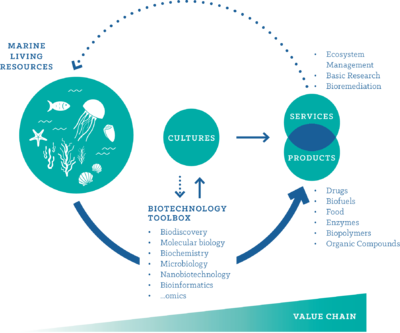Difference between revisions of "Marine Biotechnology"
Nelle Meyers (talk | contribs) |
|||
| (5 intermediate revisions by 4 users not shown) | |||
| Line 1: | Line 1: | ||
| − | The OECD defines biotechnology as ‘The application of science and technology to living organisms, as well as parts, products and models thereof, to alter living or non-living materials for the production of knowledge, goods and services’. | + | {{Image |
| + | |position = right | ||
| + | |margin = 0px 5px 5px 1em | ||
| + | |width = 400 | ||
| + | |wikiimage = MBT_2014_Diagram.png | ||
| + | |captionposition = center | ||
| + | |fontsize = 85 | ||
| + | |caption = Examples of products and services developed by technological applications using marine bioresources (diagram adapted from the European Marine Board Position Paper). <ref name="positionpaper15">Marine Biotechnology: A New Vision and Strategy for Europe, Marine Board-ESF Position Paper 15, 2010.</ref> | ||
| + | }} | ||
| + | The OECD defines biotechnology as ‘The application of science and technology to living organisms, as well as parts, products and models thereof, to alter living or non-living materials for the production of knowledge, goods and services’.<ref name="faoillustration">Source: Background Paper, OECD Global Forum on Biotechnology, Vancouver, 30-31 May 2012.</ref> | ||
This definition covers all modern biotechnology but also many more production related and traditional borderline activities used in agriculture, food and beverage production (e.g. cheese and beer). Nowadays, biotechnology is more often considered in terms of cutting-edge molecular or genomic biological applications where molecular or genetic material is manipulated to generate desirable products or other benefits. | This definition covers all modern biotechnology but also many more production related and traditional borderline activities used in agriculture, food and beverage production (e.g. cheese and beer). Nowadays, biotechnology is more often considered in terms of cutting-edge molecular or genomic biological applications where molecular or genetic material is manipulated to generate desirable products or other benefits. | ||
| Line 6: | Line 15: | ||
<p> | <p> | ||
| − | + | <br style = "clear:both"/> | |
| − | + | ==References== | |
| − | + | <references/> | |
| − | + | [[category:Marine Biotechnology]] | |
| − | |||
Latest revision as of 15:11, 3 August 2016

The OECD defines biotechnology as ‘The application of science and technology to living organisms, as well as parts, products and models thereof, to alter living or non-living materials for the production of knowledge, goods and services’.[2]
This definition covers all modern biotechnology but also many more production related and traditional borderline activities used in agriculture, food and beverage production (e.g. cheese and beer). Nowadays, biotechnology is more often considered in terms of cutting-edge molecular or genomic biological applications where molecular or genetic material is manipulated to generate desirable products or other benefits.
What we consider as biotechnology, therefore, largely depends on what techniques we include and this is linked, in turn, to what we wish to address. Marine Biotechnology encompasses those efforts that involve marine bioresources, either as the source or the target of biotechnology applications. In many cases this means that the living organisms which are used to develop products or services are derived from marine sources. At the same time, if terrestrial organisms are used to develop a biosensor which is used in the marine environment to assess the ecosystem health then it also falls within the sphere of Marine Biotechnology.